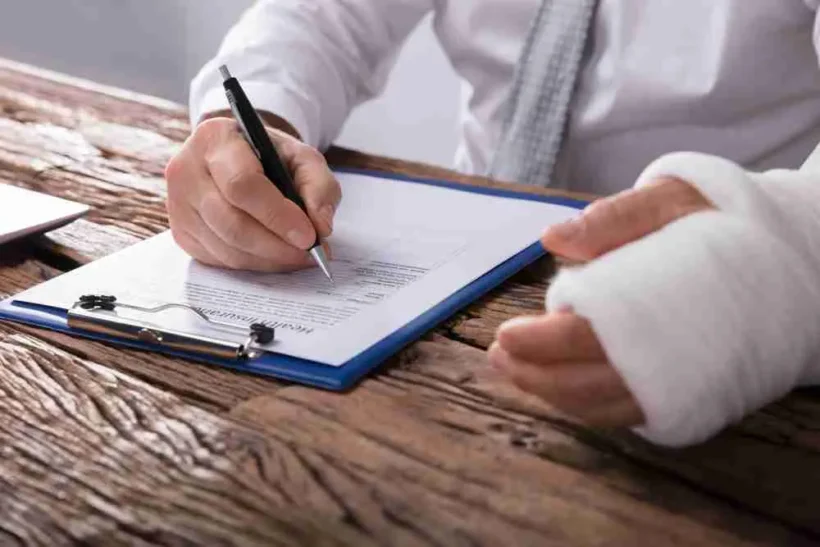Car accidents can be traumatic and life-altering events, often leading to physical injuries, emotional distress, and financial burdens. In the aftermath of a car accident, the process of pursuing compensation for injuries can be complex and challenging. One key element that plays a pivotal role in strengthening your case is medical documentation. Comprehensive and accurate medical documentation is not just a formality; it’s a critical factor in ensuring that you receive the compensation you deserve.
Understanding Medical Documentation

Medical documentation refers to the records, reports, bills, prescriptions, and other documents generated during your medical treatment after a car accident. These documents serve as a detailed account of your injuries, the care you received, and the associated costs. While it might seem like a routine aspect of seeking medical care, its significance in legal matters cannot be overstated.
According to the experienced car accident lawyers in Las Vegas, Panish Shea Boyle Ravipudi, medical documentation serves as a bridge between your injuries and the accident itself. It helps establish a clear connection between the event and the resulting injuries, providing irrefutable evidence that your injuries were directly caused by the accident. Additionally, the accuracy and thoroughness of these records play a crucial role in bolstering your credibility during legal proceedings.
Strengthening Your Car Accident Claim
When you’re seeking compensation for injuries sustained in a car accident, the burden of proof lies on you to demonstrate the validity of your claims. Medical documentation acts as a cornerstone of your case, providing tangible evidence that substantiates your injuries. Without proper documentation, your claim could be weakened, and you may face challenges in convincing insurance companies, opposing parties, or even the court of the extent of your injuries.
Records tell a story. They detail the nature of your injuries, the treatment you underwent, the medications prescribed, and the professional opinions of experts. All of these components work together to create a comprehensive narrative that leaves little room for doubt regarding the severity of your injuries and the impact they’ve had on your life.
Demonstrating the Severity of Injuries

Insurance adjusters and legal representatives often rely on medical records to assess the severity of your injuries and calculate the appropriate compensation. Detailed descriptions, diagnostic results, and expert opinions from healthcare providers paint a vivid picture of the physical and emotional toll the accident has taken on you. Documentation provides tangible evidence of your pain, suffering, and the disruptions to your daily life.
Specialists’ opinions and recommendations also play a vital role in demonstrating the long-term effects of your injuries. Whether it’s an orthopedic surgeon, neurologist, or physical therapist, their insights offer valuable information about the prognosis, potential complications, and necessary ongoing treatment. These opinions can significantly influence the amount of compensation you’re entitled to receive.
Calculating Damages and the Role of Documentation in Your Compensation
In the world of personal injury law, compensation, often referred to as damages, aims to provide financial relief to individuals who have suffered injuries due to the negligence of others. When it comes to car accident injury claims, the extent of your injuries and their impact on your life play a central role in determining the compensation you are entitled to receive. This is where medical documentation steps in as a critical component of the process.
Quantifying Economic Damages
Medical bills, treatment costs, and other measurable financial losses are classified as economic damages. Documentation serves as the foundation for quantifying these damages accurately. Your records and bills provide a clear breakdown of the medical expenses you’ve incurred as a direct result of the accident. This can include ambulance fees, hospital stays, surgeries, diagnostic tests, rehabilitation sessions, and even the costs of prescribed medications.
Accurate documentation ensures that no expense goes unnoticed or unaccounted for. It creates a comprehensive record of your medical journey, leaving no room for doubt regarding the financial impact of the accident on your life. Insurance adjusters and legal representatives will use these records to determine the appropriate compensation for your economic losses.
Establishing Non-Economic Damages

Beyond the tangible financial losses, there are non-economic damages that encompass the pain, suffering, emotional distress, and diminished quality of life you’ve experienced due to the accident. While these damages are not as straightforward to calculate, medical documentation remains essential in establishing their legitimacy and impact.
Records play a pivotal role in connecting the dots between your injuries and the emotional and psychological toll they’ve taken. Detailed reports that describe your pain levels, emotional distress, and the limitations you face in daily activities due to your injuries provide crucial insight into the non-economic damages you’ve suffered.
The Role of Medical Documentation
In the eyes of insurance companies and the legal system, medical documentation adds a layer of credibility to your claim. It showcases that your injuries are not just claimed but substantiated by medical professionals. This substantiation is essential for both economic and non-economic damages. The tangible evidence in your medical records strengthens your case and reduces the chances of disputes or attempts to downplay the extent of your injuries.
Additionally, medical documentation provides a timeline of your recovery process. It demonstrates the duration of your medical treatment, the progression of your injuries, and any setbacks you’ve faced. This timeline is crucial for establishing the duration and intensity of your pain and suffering, which is vital for calculating appropriate compensation.
Overcoming Challenges and Disputes with Strong Medical Documentation
While documentation plays a pivotal role in strengthening your car accident injury claim, there can be instances where challenges and disputes arise during the process. From pre-existing conditions to delayed treatment, having comprehensive and accurate medical documentation becomes even more critical in addressing these challenges effectively.
Challenges of Pre-Existing Conditions
One common challenge that may arise in car accident injury claims is the presence of pre-existing medical conditions. Insurance companies or opposing parties might attempt to attribute your injuries to pre-existing conditions rather than the accident itself. This is where detailed records become crucial.
Your documentation should clearly outline the condition you had before the accident and the new injuries sustained as a direct result of the accident. Clear and consistent records can help differentiate between pre-existing conditions and injuries caused by the accident, ensuring that you receive compensation for the harm directly inflicted by the collision.
Addressing Delayed Treatment
In some cases, accident victims might delay seeking medical treatment due to shock, adrenaline, or the belief that their injuries are not severe. However, insurance companies could use the delay in seeking medical attention as an argument to downplay the extent of your injuries or question their legitimacy.
Comprehensive documentation can address this challenge by explaining the reasons for the delay in seeking treatment. If you sought medical attention as soon as you realized the extent of your injuries, your medical records should reflect this. A detailed account of your medical journey, including any medical advice or recommendations for immediate treatment, can serve as evidence that your injuries were treated promptly once discovered.
The Role of Medical Experts

In cases where disputes arise, having medical experts who can provide their professional opinions becomes invaluable. Experts can review your medical documentation, conduct independent evaluations, and provide expert testimony to corroborate your claims. Their expertise can lend credibility to your case and counter any attempts to undermine the validity of your injuries.
By consistently maintaining accurate and detailed medical records, you provide medical experts with the necessary information to form an informed opinion. This synergy between your medical documentation and expert testimony can significantly strengthen your case and address any challenges or disputes that may arise.
Tips for Effective Medical Documentation and Navigating the Claims Process
As you navigate the aftermath of a car accident and work towards securing the compensation you deserve, effective medical documentation can be your strongest asset. Here are some practical tips to help you ensure that your medical records are accurate, thorough, and supportive of your car accident injury claim.
Seek Immediate Medical Attention
After a car accident, your health should be your top priority. Even if you believe your injuries are minor, it’s essential to seek medical attention promptly. Delaying medical care can not only exacerbate your injuries but also create challenges when linking them to the accident. Immediate medical attention establishes a clear timeline and connection between the incident and your injuries.
Be Honest and Comprehensive
When discussing your injuries with healthcare providers, be honest and thorough about your symptoms and any pain you’re experiencing. Accurate and detailed information will be reflected in your medical records and provide a clearer picture of the extent of your injuries. Mention any pre-existing conditions and provide a complete medical history to avoid confusion later.
Follow Medical Advice
Adhere to the treatment plan and recommendations provided by your healthcare providers. Consistency in following medical advice demonstrates your commitment to your recovery and supports the legitimacy of your injuries. Deviating from the recommended treatment plan could potentially be used against you by insurance companies or opposing parties.
Maintain a Personal Injury Journal

Keeping a personal injury journal can be a valuable tool. Record your daily experiences, pain levels, emotional state, and any challenges you face due to your injuries. This journal can serve as supplementary evidence that highlights the ongoing impact of the accident on your life. Make sure to date your entries and keep the journal organized.
Organize Your Medical Records
As you receive medical bills, reports, and records, organize them in a systematic manner. Create folders or digital files for each type of document, such as medical reports, diagnostic tests, bills, and prescriptions. Having well-organized records will make it easier for you and your legal team to access and present the necessary information during the claims process.
Document Conversations
If you have conversations with healthcare providers, insurance representatives, or legal professionals related to your injuries, document them. Keep track of dates, names, and a summary of what was discussed. These records can be useful in clarifying any misunderstandings or discrepancies that may arise later.
Consult with Legal Experts
Throughout the claims process, consulting with a personal injury lawyer is highly recommended. Experienced legal professionals can guide you through the complexities of the legal system, ensure that your rights are protected, and help you build a strong case supported by comprehensive medical documentation.
Effective Medical Documentation Is Not Just A Task
Effective medical documentation is not just a task; it’s a strategic approach that can make a significant difference in the outcome of your car accident injury claim. By prioritizing your health, being thorough in your documentation, and seeking the guidance of legal experts, you can navigate the claims process with confidence. Remember, your medical records tell the story of your injuries, your recovery journey, and your pursuit of rightful compensation.
If you’ve been injured in a car accident, don’t hesitate to reach out to a qualified personal injury lawyer. They can provide personalized advice tailored to your situation and ensure that your legal rights are upheld every step of the way. Your health and well-being deserve the best possible advocacy, and effective medical documentation is a crucial part of that journey.

